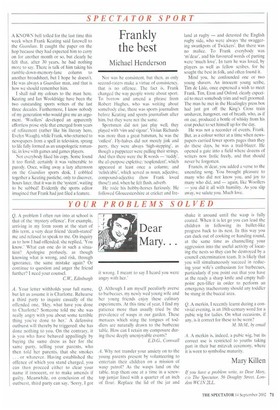Frankly the best
Michael Henderson
A KNOWN bell tolled for the last time this week when Frank Keating said farewell to the Guardian. It caught the paper on the hop because they had expected him to carry on for another month or so, but clearly he felt that, after 30 years, he had nothing more to say. There is talk of him taking his ramble-down-memory-lane column to another broadsheet, but I hope he doesn't, He was always a Guardian man, and that is how we should remember him.
I shall nail my colours to the mast here. Keating and Ian Wooldridge have been the two outstanding sports writers of the last three decades. Furthermore, I know nobody of my generation who would give me an argument. 'Wootiers' developed an apparently effortless prose style that emerged from years of refinement (rather like his literary hero, Evelyn Waugh). while Frank, who returned to newspapers from a spell in television, sprang to life fully formed as an unapologetic romantic, in love with games and games players.
Not everybody liked his copy. Some found it too florid; certainly it was vulnerable to parody. Once, wiling away a lazy afternoon on the Guardian sports desk. I cobbled together a Keating pastiche, only to discover, hours later, that it was in the 'system', waiting to be subbed! Evidently the sports editor imagined that Frank had just filed a feature. Nor was he consistent, but then, as only second-raters make a virtue of consistency, that is no offence. The fact is, Frank changed the way people wrote about sport. To borrow and amend a phrase from Robert Hughes, who was writing about somebody else, there was sports journalism before Keating and sports journalism after him, but they were not the same.
Sportsmen did not just play well, they played with 'vim and vigour'. Vivian Richards was more than a great batsman, he was the `onliesf. Fly-halves did not merely jink and parry, they were always 'high-stepping', as though a puppeteer were pulling their strings. And then there were the R words — 'ruddy', the all-purpose expletive; 'resplendent', which appeared at least once a column; and 'relish/able', which served as noun, adjective, compound-adjective (how Frank loved those!) and, when he felt flush, adverb.
He rode his hobby-horses furiously. He followed Gloucestershire at cricket and Ire land at rugby — and detested the English rugby side, who were always 'the swaggering swankpots of Twickers'. But there was no malice. To Frank everybody was `m'clear'. and his favoured words of parting were 'much love'. In turn he was loved, by players as well as fellow scribes, for he sought the best in folk, and often found it.
Mind you, he confounded one or two young shavers. An innocent young scribe, Tim de Lisle, Once expressed a wish to meet Frank; Tim, Eton and Oxford, clearly expected to meet somebody trim and well groomed. The man he met in the Headingley press box had just got off the King's Cross train unshaven, hungover, out of breath, who, as if on cue, produced a bottle of whisky from his coat pocket to set himself up for the day.
He was not a recorder of events, Frank. But, as a colour writer at a time when newspapers carried fewer sports pages than they do these days, he was a trail-blazer. He opened a gate into a field where dozens of writers now frolic freely, and that should never be forgotten.
Francis, m'dear, you added a verse to the unending song. You brought pleasure to many who did not know you, and joy to many who did, and — again, like Woollers — you did it all with humility. As you slip away, we salute you. Much love.










































































 Previous page
Previous page